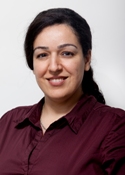Amineh Koravand is an associate professor in the Audiology and Speech-Language Pathology program of the School of Rehabilitation Sciences, Faculty of Health Sciences at the University of Ottawa. Having earned a bachelor’s degree in Audiology in Tehran (Iran) and a Master’s degree from the Université de Montréal, she completed a doctorate in biomedical sciences with a specialization in Audiology and Neuro-Audiology at the CHU Ste-Justine Research Centre as an award recipient of the Fonds de recherche en santé du Québec (FRSQ).
Prof. Koravand's research deals with the relationship between the peripheral and central auditory systems in children. Her goal is to develop neurophysiological measures (biological neuromarkers) to assess the central auditory processing at subcortical and cortical level of children during early childhood, to prevent disorders while brain plasticity is still significant. Moreover, her lab focuses mainly on applying Event Related Potentials (ERPs) combined with behavioral assessments to study plasticity in auditory neural pathways resulting from musical training, singing lessons, bilingualism, multilingualism as well as various auditory-speech deficits.
